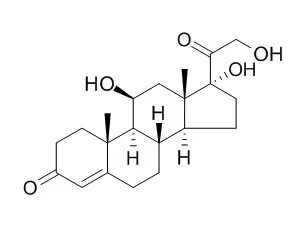| In vivo: |
| Am J Respir Crit Care Med. 2003 Feb 15;167(4):512-20. | | Immunologic and hemodynamic effects of [Pubmed: 12426230] | Within the last few years, increasing evidence of relative adrenal insufficiency in septic shock evoked a reassessment of Hydrocortisone therapy.
METHODS AND RESULTS:
To evaluate the effects of Hydrocortisone on the balance between proinflammatory and antiinflammation, 40 patients with septic shock were randomized in a double-blind crossover study to receive either the first 100 mg of Hydrocortisone as a loading dose and 10 mg per hour until Day 3 (n = 20) or placebo (n = 20), followed by the opposite medication until Day 6. Hydrocortisone infusion induced an increase of mean arterial pressure, systemic vascular resistance, and a decline of heart rate, cardiac index, and norepinephrine requirement. A reduction of plasma nitrite/nitrate indicated inhibition of nitric oxide formation and correlated with a reduction of vasopressor support. The inflammatory response (interleukin-6 and interleukin-8), endothelial (soluble E-selectin) and neutrophil activation (expression of CD11b, CD64), and antiinflammatory response (soluble tumor necrosis factor receptors I and II and interleukin-10) were attenuated. In peripheral blood monocytes, human leukocyte antigen-DR expression was only slightly depressed, whereas in vitro phagocytosis and the monocyte-activating cytokine interleukin-12 increased. Hydrocortisone withdrawal induced hemodynamic and immunologic rebound effects.
CONCLUSIONS:
In conclusion, Hydrocortisone therapy restored hemodynamic stability and differentially modulated the immunologic response to stress in a way of antiinflammation rather than immunosuppression. | | J Clin Endocrinol Metab. 2001 Dec;86(12):5988-91. | | Hydrocortisone suppresses intranuclear activator-protein-1 (AP-1) binding activity in mononuclear cells and plasma matrix metalloproteinase 2 and 9 (MMP-2 and MMP-9).[Pubmed: 11739475 ] | Having demonstrated recently that Hydrocortisone (HC) suppresses intranuclear and total cellular nuclear factor-kappa B (NF-kappa B) and increases inhibitor kappa B (I kappa B) in mononuclear cells (MNC), in vivo, we have now investigated the effect of Hydrocortisone on the other major pro-inflammatory transcription factor, AP-1 and the two proteins, MMP-2 and MMP-9, whose transcription is modulated by it. MMP's hydrolyze extracellular matrix proteins and thus, allow the spread of inflammation.
METHODS AND RESULTS:
HC (100 mg) was given intravenously to eight normal subjects following an overnight fast. Blood samples were obtained at 0, 1, 2, 4, 8 and 24 h. MNC were separated and the nuclear fractions and cellular homogenates were prepared by standard techniques. AP-1 binding activity was measured by electrophoretic mobility shift assay (EMSA). Plasma MMP-2 and MMP-9 were measured by ELISA. AP-1 binding activity fell significantly at 1, 2, 4 and 8 h. Plasma MMP-2 concentration also decreased significantly at 1, 2, 4 and 8 h while MMP-9 decreased at 1 and 2 h.
CONCLUSIONS:
These data demonstrate that the acute anti-inflammatory effect of HC, in vivo, is, in part, due to AP-1 suppression and a reduction in MMP-2 and MMP-9. Thus, HC may reduce the extracellular spread of inflammation through the inhibition of matrix metalloproteinases. | | Psychopharmacology (Berl). 1999 Aug;145(3):260-6. | | The effects of chronic administration of hydrocortisone on cognitive function in normal male volunteers.[Pubmed: 10494574] | Corticosteroids are elevated in certain neuropsychiatric disorders and this may contribute to the neuropsychological impairments reported in these disorders.
To examine the effects of Hydrocortisone on learning, memory and executive function.
METHODS AND RESULTS:
Hydrocortisone 20 mg was administered twice daily for 10 days to normal male volunteers in a randomized, placebo control, crossover, within-subject design. Learning, memory and executive function were measured using selected subtests from the Cambridge Neuropsychological Test Automated Battery.
Hydrocortisone caused impairments of visuo-spatial memory. These included increased within search errors and impaired use of strategies on the spatial working memory subtest. In addition, administration of Hydrocortisone was associated with more errors in the paired associate learning subtest, although no effect was found on the Tower of London. Hydrocortisone speeded response latencies in certain tests (pattern and spatial recognition memory).
CONCLUSIONS:
These results indicate that chronic administration of Hydrocortisone leads to deficits in certain tests of cognitive function sensitive to frontal lobe dysfunction and may contribute to the cognitive impairment reported in certain neuropsychiatric disorders. |
|






 Cell. 2018 Jan 11;172(1-2):249-261.e12. doi: 10.1016/j.cell.2017.12.019.IF=36.216(2019)
Cell. 2018 Jan 11;172(1-2):249-261.e12. doi: 10.1016/j.cell.2017.12.019.IF=36.216(2019) Cell Metab. 2020 Mar 3;31(3):534-548.e5. doi: 10.1016/j.cmet.2020.01.002.IF=22.415(2019)
Cell Metab. 2020 Mar 3;31(3):534-548.e5. doi: 10.1016/j.cmet.2020.01.002.IF=22.415(2019) Mol Cell. 2017 Nov 16;68(4):673-685.e6. doi: 10.1016/j.molcel.2017.10.022.IF=14.548(2019)
Mol Cell. 2017 Nov 16;68(4):673-685.e6. doi: 10.1016/j.molcel.2017.10.022.IF=14.548(2019)